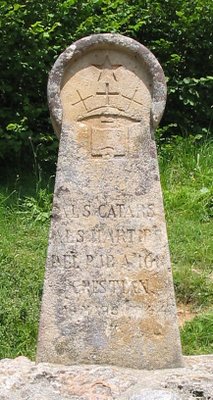Remembering The Dead
 (Pictured: The monument to the Cathars at Montségur)
(Pictured: The monument to the Cathars at Montségur)And the horrible crimes of the Pope's men were not only directed against the living:
As soon as the Inquisitors were back in Toulouse the trials began again, with increased violence. A large number of people were denounced by a former perfectus, Raymond Gros, who had of his own free will become a Catholic convert. His revelations caused a good many posthumous trials to be held: many of the corpses that were dug up and committed to the flames had belonged to the nobility or higher bourgeoisie. In September 1237, too, the cemeteries were subjected to a most thorough official search; the graves of twenty or so of the most highly respected people in Toulouse were violated, and their bones or decomposing carcasses dragged through the streets on hurdles, while the public crier recited the names of the deceased, adding: Qui atal fara, atal pendra [Whoso does the like, will suffer a like fate].
(Zoe Oldenbourg, Massacre at Montségur, Pantheon Books, New York, 1961).
As I mentioned in my first post, these men of the Church and the nobility were monsters, and fully deserve to be remembered as such -- and certainly, they should have never been given the multiple free passes that have been bestowed upon them by a corrupt establishment throughout history. Know the truth, and should you ever have the sweet fortune to journey to Montségur, kneel before the monument to the Cathars, and recall the courageous example they set for us all.

0 Comments:
Post a Comment
<< Home